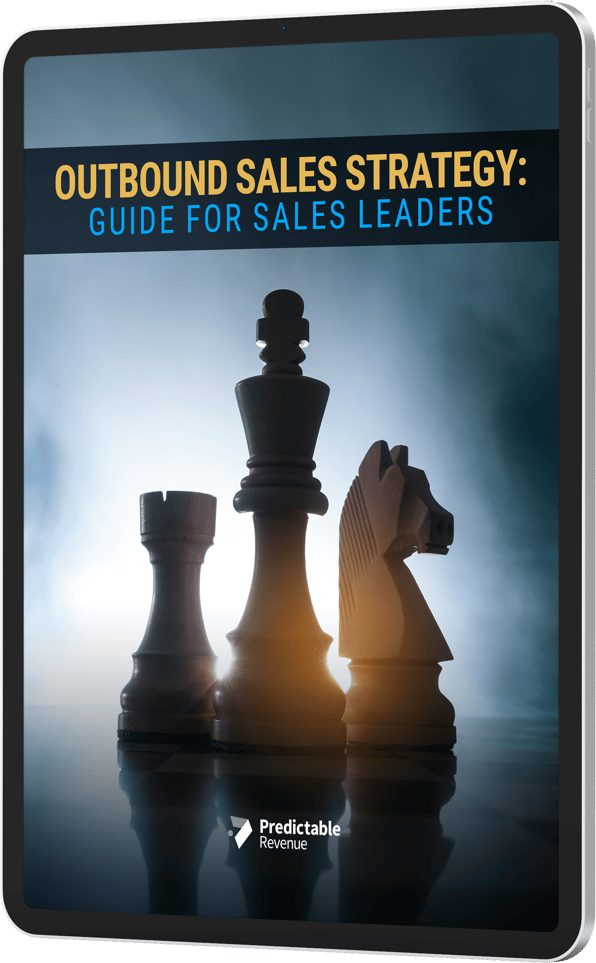Outbound Sales Strategy:
Guide for Sales Leaders
Tips for sales leaders that will help you build a sales development team that generates predictable, repeatable, and scalable revenue.

The B2B sales industry is everchanging, and as a sales leader, it’s essential to stay on top of trends.
In this ebook, you will learn:
- How to perfect your value proposition
- Why you need to identify your Zebra
- How to build a pivot-ready sales development team
- Tips for tracking and analyzing Growth Data
- How to avoid common growth potholes, and
- Counter experience asymmetry on your outbound sales team.
Together, these tips will help you build a sales development team that generates predictable, repeatable, and scalable revenue.

GET YOUR FREE COPY!
Ebook Excerpt
Experience Asymmetry: Why Young Reps Struggle Selling To Experienced Buyers
David Priemer first noticed experience asymmetry when he was 25 years old and working as a solution engineer for an enterprise software company. As part of the sales process, he often found himself in boardrooms doing custom coding and product demos for groups of executives in traditional spaces like manufacturing, financial services, and airlines.
On one occasion, while he was setting up in a boardroom to give a day-long demo, one of the executives jokingly said, “Hey David, I bet we’ve got systems here older than you!” The comment elicited a chuckle from all the executives present and David realized this man was right. Most of the people in the room had been working at this company for as long, if not longer than he had been alive.
“They were probably thinking, ‘Who is this kid? What is he going to teach us about running a business?’”
David’s experience is common for young sellers in the B2B tech space. In many cases, salespeople are speaking to customers whose jobs they’ve never done. It’s difficult, then, to put oneself in the customer’s shoes and imagine their pain points and desires.
In addition, these salespeople are often selling complex, innovative software solutions that the older executives have never encountered before. This is true for both young salespeople and for tenured sales reps who are new to a job.
When selling to someone older or more experienced, they tend to think “Why should this person listen to me?” – which in turn is perceived by the buyer as a lack of conviction and credibility. And that can kill the sale before it even begins.
TEACHING CONVICTION
When David was running the Eastern US sales team at Salesforce, he worked out of Toronto with both local reps and ones based in Atlanta and New York. The New York reps were young, enthusiastic, and hustled like no one else. They completed the most amount of activities and were always on the go, but sometimes, despite that, David had reps with no pipeline.
So he began to dig a little. He’d ask them if they had enough accounts. If they were connecting on the phone, and if the tools and tech were working for them. When they said yes to all this, he realized he had no choice but to listen to their sales calls to see why they weren’t converting.
The calls revealed something surprising: the reps’ tone of voice was severely lacking in confidence. David likened it to how one of his three kids sounds when they’re about to ask him for something that they know he’s not going to give them. So David set out to teach his reps (and his kids) conviction.
When someone innately believes in or is passionate about something, you can feel it in their energy and tone of voice. But younger, less experienced reps sometimes lack the level of knowledge about their product that results in that conviction. In his book “To Sell is Human”, Dan Pink describes this as information asymmetry.
David liked that imagery and decided not only to use the term but to help his team overcome this challenge. The solution doesn’t lie in replacing your young reps with more experienced ones; instead, sales leaders need to understand the unique challenges younger reps face. With the right strategy and knowledge, younger salespeople can become top performers.
TOP CHALLENGES FOR YOUNGER SELLERS
1. Because young salespeople have never done the job of the person they’re selling to, they don’t necessarily understand the pains the customer experiences in their day-to-day life.
2. Young salespeople don’t have the life experience they can lean on to build credibility.
3. Especially in the B2B tech space, what we do is relatively unimportant–we’re not curing cancer, splitting the atom, or feeding children in developing countries. If we did, it may be easier to muster conviction around selling our products. It can be difficult for salespeople of any age to manifest passion about something so seemingly banal.
BENEFITS OF HAVING YOUNG SALESPEOPLE
There is another side to David’s anecdote about the executive joking about his age. After he completed his demo, another executive said, “You know, if we had some old person coming in here talking about the latest technology, I don’t know if we would believe him.”
Young people are naturally equipped to sell innovative solutions. They bring a certain passion, conviction, and enthusiasm which can be contagious if (and only if) it is harnessed and coached in the right way. Young people are used to talking about new technology, and that familiarity makes them the best ambassadors for tech companies.
3 STRATEGIES FOR CONVERTING MORE EXPERIENCED BUYERS
If you have younger salespeople on your team or reps who are new to the industry, David recommends a few proven strategies to convert more experienced buyers.
1. Know their pain points
One of David’s clients has been very successful because of their sales reps’ use of assumptive priming–a system they used to come up with one to three pain points their prospects are likely experiencing based on what they already know about them: their role, their company, their industry, and the systems they currently use to complete a task.
This simple tactic is the reason the company’s salespeople, though fresh out of college or retail jobs, were able to get four months tenured conversion rates in as little as three weeks.
2. Invoking the credibility of others
If a young seller says “what I’ve seen” or “what I’ve heard,” the customer may end up questioning their limited experience. David suggests that instead, sellers think about who does have credibility when talking to their prospects.
For example, other customers–your prospect’s peers who have found value in your solution. Alternatively, young reps can rely on the collective experience of your organization. The company or founder may have been in business for many years, which makes for better credibility.
Third-party resources, studies, articles, and books can all build credibility. If young people shift their phrasing away from “I” and instead speak from the perspective of those with more experience, they can borrow conviction until they develop it themselves.
3. Present arguments with conviction
Your prospect can tell if you don’t believe in what you’re selling. That’s why instead of talking about the features and benefits, David coaches salespeople to lead with what they believe in. What is the company’s mission? Why do you do what you do? Why does your company exist in the first place?
Young sellers will need training wheels here. One of the easiest ways to relate to what you do is David’s love/hate method: the love part is the desired future state that your customers aspire to. The hate is the thing blocking them.
For example, from Cerebral Selling: “People love to buy stuff but they hate talking to salespeople.” Or Trunk Club’s tagline, “For men who love to dress well but hate to shop.”
Love and hate are emotionally charged words that can help your salespeople anchor their feelings about your company’s mission and sell with conviction.
WHAT SALES LEADERS CAN DO TO FIX EXPERIENCE ASYMMETRY
David would never have picked up on the experience asymmetry at Salesforce if he hadn’t been listening to their calls, and he maintains that this is the most important thing for sales leaders to do. Train your reps using David’s tactics above, and share the call recordings of successful reps with your whole team.
Experience asymmetry can be a silent deal killer. If you’re not addressing it, you’re missing out on improving conversion in a big way. By listening to your reps’ calls and having them follow the steps outlined above, you can help eliminate that experience asymmetry–or at least help your reps fake it ‘til they make it.
Copyright © 2021 Predictable Revenue. All Rights Reserved.